|
|
|
Sort Order |
|
|
|
Items / Page
|
|
|
|
|
|
|
| Srl | Item |
| 1 |
ID:
146644
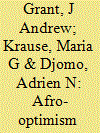

|
|
|
|
|
| Summary/Abstract |
The Africa Day 2015 Symposium provided a unique opportunity to develop glocal networks among activists, learners, scholars, researchers, and community members based in central Canada and other parts of the world. The Symposium examined a wide range of scholarship on Africa including calls for ending oppression based on sexual identity, greater policy responses to health, gender, and human security challenges, improving governance of natural resources, and investigating the prospects for glocal networks. While this scholarship stressed the need for Afro-optimism, it also drew attention to on-going human security challenges faced by many across the continent. This article builds upon the momentum from the Symposium by amplifying the voices of African scholars and enhancing mentorship, emphasizing greater cooperation among researchers and communities based inside and outside Africa, and defeating misconceived allusions to Afro-pessimism. Based on critical scholarship, the article also highlights innovative governance insights that are adapted to specific situations across Africa.
|
|
|
|
|
|
|
|
|
|
|
|
|
|
|
|
| 2 |
ID:
077346


|
|
|
|
|
| Publication |
2006.
|
| Summary/Abstract |
Criminal-states and Criminal-soldiers are two interrelated threats that challenge order and stability at local, national, and potentially global levels. Policing and law enforcement are essential to securing the conditions necessary for stable governance and preserving the rule of law. Law enforcement and police services play key roles in ensuring community stability. They also control and contain criminal threats, protect individual liberties, and enable other political and diplomatic processes to function. This afterward examines the role of police and enforcement agencies in countering the threats posed by criminal-soldiers in order to prevent the establishment or spread of criminal-states.
|
|
|
|
|
|
|
|
|
|
|
|
|
|
|
|
| 3 |
ID:
119277
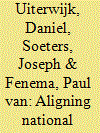

|
|
|
|
|
| Publication |
2013.
|
| Summary/Abstract |
This article analyzes the public side of the NH90 network consisting of four participating countries (Germany, France, Italy, and the Netherlands) and their industrial partners. Comparable to observations in earlier international projects in the defense sector, the development and production of the NH90 defense helicopter did not match original plans and costs estimates. On the basis of four mechanisms that were intended to facilitate the cooperation between the partnering countries (the General Memorandum of Understanding; coalition formation; the role of the central agency; and the process of vertical escalation) the question is posed whether or not there was a true alignment of national interests and "logics." The lack of standardization, as well as program delays and issues concerning the division of the work-share, lead to the emerging alignment being characterized as "quasi-alignment" at best.
|
|
|
|
|
|
|
|
|
|
|
|
|
|
|
|
| 4 |
ID:
080435
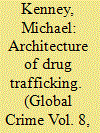

|
|
|
|
|
| Publication |
2007.
|
| Summary/Abstract |
For much of the past twenty-five years, the US-led war on drugs has been premised on a fundamental misunderstanding of Colombian drug trade. Instead of being run by a handful of massive, price-fixing 'cartels', the Colombian drug trade, then and now, was characterized by a fluid social system where flexible exchange networks expanded and retracted according to market opportunities and regulatory constraints. To support this interpretation, I draw on primary and secondary source data I collected in Colombia and the US, including interviews with several dozen hard-to-reach informants. I analyze these data to analyze the organisational form and functioning of 'Colombian' trafficking networks, focusing on how these illicit enterprises communicate, coordinate their activities, and make decisions, with an eye towards deflating some of the more persistent myths that have grown up around these transnational enterprises
|
|
|
|
|
|
|
|
|
|
|
|
|
|
|
|
| 5 |
ID:
118157
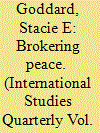

|
|
|
|
|
| Publication |
2012.
|
| Summary/Abstract |
After over 20 years of fighting in Northern Ireland, the Belfast Agreement of 1998 has successfully implemented a power-sharing agreement. Belfast was not the first attempt at a peaceful settlement; indeed, some scholars count as many as seven prior peace attempts in Northern Ireland, the most significant being the Sunningdale Agreement of 1973. Why was it that politicians successfully negotiated the peace in 1998, while these prior attempts failed? Drawing from social network theory, I argue that the Belfast Agreement succeeded, not because of a change of interests or disappearance of spoilers, but because of the presence of brokers at the bargaining table. Brokers, in particular, have the capacity to legitimate settlements-to frame settlements in such a way that they appear consistent with principles held by multiple coalitions. As a result, brokers are both more likely to build a winning coalition for a settlement, as well as marginalize spoilers who seek to undermine the peace.
|
|
|
|
|
|
|
|
|
|
|
|
|
|
|
|
| 6 |
ID:
169144
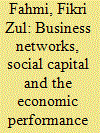

|
|
|
|
|
| Summary/Abstract |
This study examines the ways in which networking characteristics and practices influence the economic performance of creative and cultural industries. The notion of social capital is used to conceptualise the complex nature of networks, including both professional and social relationships that occur on multiple levels. This qualitative study is set in the context of Indonesia, in which two cases are examined: creative apparel entrepreneurs in Bandung and batik producers in Surakarta. The results show that regional environments provide opportunities for creative industries to find specialist suppliers, to gather market information and, importantly, to find and cross‐fertilise new ideas. Although regions provide these opportunities, the firms’ internal social capital is crucial in being able to internalise and transform the knowledge from the environment into innovative values embodied in their products.
|
|
|
|
|
|
|
|
|
|
|
|
|
|
|
|
| 7 |
ID:
133768


|
|
|
|
|
| Publication |
2014.
|
| Summary/Abstract |
Over the years, China's Lancang dam cascade has been the target of widespread contestation arising mainly from an evolving network of dam opponents. Operating across borders, these activists play an increasingly prominent role in the transboundary governance of the Lancang-Mekong River, working to curb China's hydropower expansion and hold its dam developers to account.
|
|
|
|
|
|
|
|
|
|
|
|
|
|
|
|
| 8 |
ID:
145693
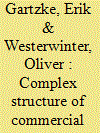

|
|
|
|
|
| Summary/Abstract |
Researchers continue to debate the impact of trade on interstate conflict. While many view trade as pacifying, others argue that dependencies increase friction and the risk of war. We provide a theory that explains how cross-border economic ties alternately enhance or impede international cooperation. Three main factors account for the heterogeneous effects of trade on conflict: interdependence, asymmetry, and multipolarity. Interdependence can act as a substitute for, or as a deterrent to, militarized violence. In the former case, interdependence actually increases more modest non-militarized conflict, while also discouraging militarized disputes. Asymmetry diminishes the conflict-inhibiting effect of trade ties, as dependency cannot simultaneously be used to coerce and to inform. Multilateral trade networks alternately moderate or enhance the bilateral effects of interdependence and asymmetry on interstate peace. Our theory and evidence reveal complex, cross-cutting consequences of economic interdependence on conflict behavior and also demonstrate effects well beyond the dyad, suggesting the need to include extradyadic ties in future theoretical and empirical research studying the commercial peace.
|
|
|
|
|
|
|
|
|
|
|
|
|
|
|
|
| 9 |
ID:
092751


|
|
|
|
|
| Publication |
2009.
|
| Summary/Abstract |
This paper presents a comprehensive design of electricity transmission charges that are meant to recover regulated network costs. In addition, these charges must be able to meet a set of inter-related objectives. Most importantly, they should encourage potential network users to internalize transmission costs in their location decisions, while interfering as least as possible with the short-term behaviour of the agents in the power system, since this should be left to regulatory instruments in the operation time range. The paper also addresses all those implementation issues that are essential for the sound design of a system of transmission network charges: stability and predictability of the charges; fair and efficient split between generation and demand charges; temporary measures to account for the low loading of most new lines; number and definition of the scenarios to be employed for the calculation and format of the final charges to be adopted: capacity, energy or per customer charges. The application of the proposed method is illustrated with a realistic numerical example that is based on a single scenario of the 2006 winter peak in the Spanish power system.
|
|
|
|
|
|
|
|
|
|
|
|
|
|
|
|
| 10 |
ID:
190002


|
|
|
| 11 |
ID:
181646


|
|
|
|
|
| Summary/Abstract |
Turkey imposed open-ended blanket curfews beginning in 2015, resulting in gross human rights violations. This article analyzes strategies employed by domestic activists to address violations. It explains what worked, what did not, and why. It argues that longstanding barriers to mass mobilization, including some that predate de-Europeanization, shaped activists’ mobilization strategies. Because of an unfavorable domestic environment, activists used a boomerang strategy, disseminating information to international allies who applied pressure to Turkish officials. This strategy effectively mobilized transnational human rights networks, resulting in a continuous and concerted effort by international actors to persuade Turkish officials to protect human rights while countering terrorism. Nevertheless, the boomerang strategy and a legal strategy to file applications with the European Court of Human Rights ultimately failed to generate a shift in policy. The article concludes with a discussion about the factors that contributed to this outcome.
|
|
|
|
|
|
|
|
|
|
|
|
|
|
|
|
| 12 |
ID:
150482
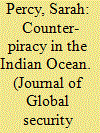

|
|
|
|
|
| Summary/Abstract |
This article examines how a group of loosely connected, often adversarial states have managed to conduct successful counter-piracy operations off the coast of Somalia. The traditional literature on multinational military cooperation assumes that such cooperation will be successful when it is hierarchically organized with a strong central command and unity of action. Counter-piracy has functioned well because it takes a fundamentally different, networked form. Counter-piracy operations are egalitarian, rather than hierarchical, and operate using informal links between militaries. This article considers the implications of informal military cooperation, and the extent to which lessons from counter-piracy can be applied elsewhere.
|
|
|
|
|
|
|
|
|
|
|
|
|
|
|
|
| 13 |
ID:
160205
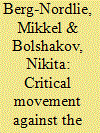

|
|
|
|
|
| Summary/Abstract |
In 2010, Russian authorities presented a new draft law on education, which immediately became controversial. The essay examines whether user groups (parents) and low-ranking sector employees (teachers) were active in the movement critical of the reform, and how the state responded to the anti-reform movement. The movement consisted of several networks and organisations with no central node. It included teachers, parents and activists from both non-systemic groups and systemic opposition parties. Pressure from below by networks and organisations was combined with pressure from actors situated above in the political system, that is, in the Duma. Since the movement was welfare-oriented rather than fundamentally regime-critical, the Russian authorities tolerated open criticism both from civil society and inside the Duma. Some gains for teachers were won, but the movement’s proposed amendments and demands were generally rejected or only introduced in revised form.
|
|
|
|
|
|
|
|
|
|
|
|
|
|
|
|
| 14 |
ID:
115218
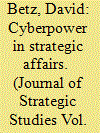

|
|
|
|
|
| Publication |
2012.
|
| Summary/Abstract |
This article explores the effect of connectivity on strategic affairs. It argues that the effect on war's character is potentially, although not yet shown in practice, considerably large. Its effect upon the distribution of power among states in the international system is small, contrary to the claims of `cyberwar' alarmists. All told, however, its effect upon strategic affairs is complex. On the one hand, it represents a significant advance in the `complexification' of state strategies, understood in the sense of the production of intended effects. On the other hand, strategists today - still predominantly concerned with the conflicts and confrontations of states and organised military power - are generally missing the power which non-traditional strategic actors, better adapted to the network flows of the information age, are beginning to deploy. These new forms of organization and coercion will challenge the status quo.
|
|
|
|
|
|
|
|
|
|
|
|
|
|
|
|
| 15 |
ID:
174613
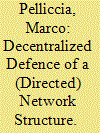

|
|
|
|
|
| Summary/Abstract |
We model the decentralized defence choice of agents connected in a directed graph and exposed to an external threat. The network allows players to receive goods from one or more producers through directed paths. Each agent is endowed with a finite and divisible defence resource that can be allocated to their own security or to that of their peers. The external threat is represented by either a random attack on one of the nodes or by an intelligent attacker who aims to maximize the flow-disruption by seeking to destroy one node. We show that under certain conditions a decentralized defence allocation is efficient when we assume the attacker to be strategic: a centralized allocation of defence resources which minimizes the flow-disruption coincides with a decentralized equilibrium allocation. On the other hand, when we assume a random attack, the decentralized allocation is likely to diverge from the central planner’s allocation.
|
|
|
|
|
|
|
|
|
|
|
|
|
|
|
|
| 16 |
ID:
121821
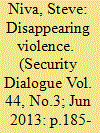

|
|
|
|
|
| Publication |
2013.
|
| Summary/Abstract |
In the twilight of the USA's ground wars in Iraq and Afghanistan, there has been an expanding shadow war of targeted killings and drone strikes outside conventional war zones, where violence is largely disappeared from media coverage and political accountability. While many attribute the growth in these shadowy operations to the use of new technologies and platforms such as drones, this article argues that the central transformation enabling these operations is the increasing emergence of network forms of organization within and across the US military and related agencies after 2001. Drawing upon evidence from unclassified reports, academic studies, and the work of investigative journalists, this article will show that elements within the US military and related agencies developed in the decade after 2001 a form of shadow warfare in which hybrid blends of hierarchies and networks combine through common information and self-synchronization to mount strike operations across transnational battle spaces. But, rather than a top-down transformation towards networks, this article will show how it was the evolution of the Joint Special Operations Command (JSOC) from an elite strike force into a largely autonomous networked command that has been central to this process. Although drone strikes have received the bulk of critical attention in relation to this expanding shadow war of targeted killing, this often-lethal networked warfare increasingly resembles a global and possibly permanent policing operation in which targeted operations are used to manage populations and threats in lieu of addressing the social and political problems that produce the threats in the first place.
|
|
|
|
|
|
|
|
|
|
|
|
|
|
|
|
| 17 |
ID:
152796
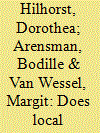

|
|
|
|
|
| Summary/Abstract |
In international development, shared ownership is assumed to be a condition for effectiveness. Academic studies question this relation, claiming shared ownership can instead lead to ineffectiveness. This study analysed the interplay between ownership and effectiveness in a transnational advocacy network for conflict prevention observed 2012–2015. Building on recent discussions about balancing unity and diversity in networks, this article unpacks the ownership/effectiveness relationship into three dimensions: collective identity, accountability processes and a shared advocacy message. We find that the question is not about more or less effectiveness, but about the processes shaping the meaning of effectiveness in particular institutional constellations.
|
|
|
|
|
|
|
|
|
|
|
|
|
|
|
|
| 18 |
ID:
144197


|
|
|
|
|
| Summary/Abstract |
This paper considers how existing concepts underlying the development of the Internet are being strained in the emerging Internet of Things (IoT). It also explores how the well-known and tried Domain Name Service concepts, which map hierarchic names to addresses, can be extended for the IoT. The extension greatly broadens the concept of name/address mapping to digital objects with identifier/attribute database mapping for physical objects, applications, and data. Finally, this essay discusses the properties of the identifier management systems, showing how scalability, security, and flexibility can be supported in the IoT.
|
|
|
|
|
|
|
|
|
|
|
|
|
|
|
|
| 19 |
ID:
162513


|
|
|
|
|
| Summary/Abstract |
How do institutions shape revisionist behavior in world politics? Applying a network-relational approach to revisionist states and challenges to institutional order, I conceive of institutions as networks—as patterns of ongoing social transactions in which revisionists are embedded. Revisionist behavior is shaped by how a state is positioned within this existing network of institutions. A state's position significantly influences the material and cultural resources the state can deploy in pursuit of its aims, and thus the revisionist's strategy. Focusing on two measures of network position—access and brokerage—I propose four ideal types of revisionists and their strategies in the international system: integrated revisionists, who are likely to pursue institutional engagement; bridging revisionists, who will seek rule-based revolution; isolated revisionists, who prefer to exit the institutional system; and rogue revisionists, who have few resources at hand, and thus ultimately must resort to hegemonic violence. I test these ideal types in four cases of revisionists and institutional orders: Russia in the 1820s; Prussia in the 1860s; the Soviet Union in the early Cold War; and Japan in the 1920s and 1930s.
|
|
|
|
|
|
|
|
|
|
|
|
|
|
|
|
| 20 |
ID:
128856
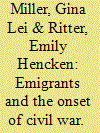

|
|
|
|
|
| Publication |
2014.
|
| Summary/Abstract |
We propose that emigrants affect the likelihood of civil war onset in their state of origin by influencing the willingness of individuals to join rebel movements and the probability that the state and rebels will be unable to reach a mutually acceptable bargain to avoid conflict in three ways. First, migrants communicating with actors at home facilitate valid comparisons between the effects of policies in the home state as compared to policies in the host state enacted on a similar group, creating new motivation to join collective challenges against the state. Second, migrants send remittances, providing resources that can be used in collective challenges that are particularly difficult for states to anticipate, making the outbreak of conflict more likely. Finally, migrants publicize information about conditions in their home state while living in the host state, reducing home government uncertainty such that conflict is less likely to occur. We test these hypotheses on an international dataset and find support for each of our predicted mechanisms.
|
|
|
|
|
|
|
|
|
|
|
|
|
|
|
|
|
|
|
|
|